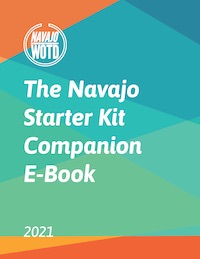bą́ą́h ílį́
it is worth, it costs
bah eel ih
Bą́ą́h ílį́ is a Navajo expression that means “it is worth” or “it costs”.
Together with díkwíí, which denotes a query, you can ask “Díkwíí bą́ą́h ílį́?” and you would be asking “How much does this cost?” or “How much is this worth?”
Of course, this does not always apply to cost in terms of money. It can be used to denote the cost of a trade, as in “It cost 14 (woven) rugs.”
Beyond bą́ą́h ílį́, there is also bą́ą́h azlį́į́’ which is the past tense. (When I say past tense, I really mean ‘perfective’ – which is a way of saying the action was finished, perfected, or completed.) Bą́ą́h azlį́į́’ means “it cost.”
Going the other direction in time is bą́ą́h adooleeł, or “it will cost.”
Using béeso (money – dollars) as the currency, you can state a price:
Naakits’áadah béeso bą́ą́h ílį́. It costs 20 dollars.
Or, confirm a price using a conditional:
Da’ dízdiin béeso bą́ą́h azlį́į́’? Did it cost 40 dollars?
Original post date: .
